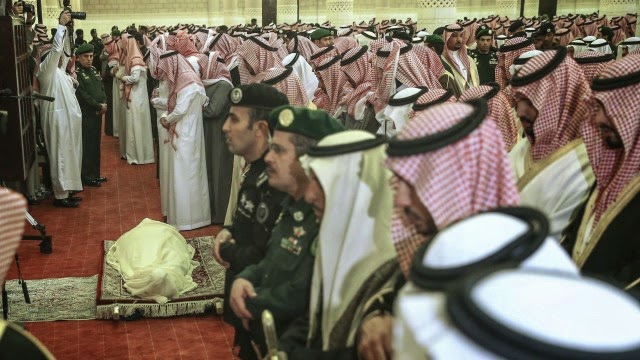Unmarked grave for Saudi king
Saudi Arabia's King Abdullah, one of the richest men in the history of the world, was carried in a simple white shroud to an unmarked grave on Friday in a Riyadh cemetery where many of his commoner subjects rest, in keeping with ascetic traditions.
The Saudi state school of Wahhabi Sunni Islam holds ostentatious displays of grief or mourning to be sinful, akin to idolatry.
 There was no official mourning period in Saudi Arabia and flags around the kingdom all flew at full staff. Despite his apparent popularity among his subjects, there were no spontaneous gatherings on city streets to mark his passing.
There was no official mourning period in Saudi Arabia and flags around the kingdom all flew at full staff. Despite his apparent popularity among his subjects, there were no spontaneous gatherings on city streets to mark his passing.Government offices, closed for the Middle East's normal Friday-Saturday weekend, will open as usual on Sunday.
While the afternoon prayer that preceded Abdullah's burial took place before ranks of Muslim leaders, Saudi princes, powerful clerics and billionaire Arab businessmen, his body was transported to the mosque in a city ambulance.
 It was borne through the crowds on a carpet on a simple stretcher, laid in front of the faithful at prayer and then carried by Abdullah's male relatives to the graveyard, where it was laid in the ground with no ceremony.
It was borne through the crowds on a carpet on a simple stretcher, laid in front of the faithful at prayer and then carried by Abdullah's male relatives to the graveyard, where it was laid in the ground with no ceremony. It was a change for the king who, during his lifetime, travelled in the luxury one might expect of the absolute monarch of the world's leading oil exporter. A 2006 US diplomatic cable noted that he personally asked a US envoy for his Boeing 747 to be outfitted with all the same security systems as the Air Force One of his friend, then-President George W Bush.
It was a change for the king who, during his lifetime, travelled in the luxury one might expect of the absolute monarch of the world's leading oil exporter. A 2006 US diplomatic cable noted that he personally asked a US envoy for his Boeing 747 to be outfitted with all the same security systems as the Air Force One of his friend, then-President George W Bush.Compared to the opulent style of many of his brothers and nephews, Abdullah lived frugally, choosing to holiday in a desert camp instead of brash Mediterranean palaces. He was also known for curbing some of his family's excesses once in power, ordering princes to pay their phone bills and book seats on the national airline in advance.
In Wahhabism's austere reading of Islam, elaborate shrines contradict the ideal of egalitarianism that should unite all Muslims. Some Wahhabi followers have interpreted the tenet as requiring the destruction of shrines to Sufi saints and Shi'ite imams across the Middle East.
Abdullah's predecessors and other half brothers have also been interred in unmarked graves in the al-Aoud cemetery where he was buried on Friday, as well as in other simple graveyards in the kingdom's other cities.
The Al Saud family has also always striven to distinguish itself from European monarchies, preferring to hark to the tribal roots of its leadership in which ordinary Saudis theoretically remain able to petition kings.
Nevertheless, there is no shortage of monuments to Abdullah in Saudi Arabia: his name adorns a giant university in Jeddah, a scholarship fund, a "medical city" hospital complex in Mecca, the state renewable energy agency and a boulevard in Riyadh recently given a lavish upgrade.
Abdullah and his successor Salman style themselves as both king and Custodian of the Two Holy Mosques - a clear indication of how they view the importance of their religious credentials in underpinning their legitimacy.





No comments: